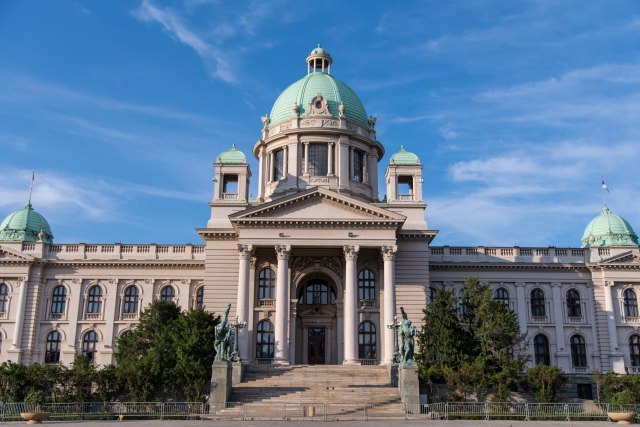Decision made: Serbian Parliament adopts a set of election laws
Tonight, Assembly of Serbia adopted a set of election laws which should improve the election conditions for the next elections, which are announced for April 3.
Friday, 04.02.2022.
20:08

Decision made: Serbian Parliament adopts a set of election laws
The draft election laws arose as a result of parallel inter-party dialogues on election conditions, conducted with and without EU mediators, as well as on the recommendations of the OSCE Office for Democratic Institutions.MPs adopted the Draft Law on the Election of People's Deputies, on Local Elections, on the Election of the President of the Republic, as well as the Draft Law on Financing Political Activities and Amendments to the Law on Prevention of Corruption.
Better control of the elections is expected, given that the opposition will have its members in the REC, as well as at least 16.000 members in the electorate throughout Serbia.
The draft laws do not change the essential aspects of elections for deputies, elections for the President of the Republic and councilors of local self-government units, i.e. they retain the current legal solutions that can be considered the basic postulates of the election process in Serbia.
The novelties passed by these three election laws are important primarily in terms of protection of rights in election procedures and easier candidacy of political parties of national minorities, as well as in terms of organization and transparency of the work of election administration bodies.
National minorities will not have to collect 10.000, but 5.000 signatures in order for their list to be proclaimed.
The Assembly adopted the Law on Social Entrepreneurship
Tonight, the Assembly of Serbia adopted the Law on Social Entrepreneurship, which legally regulates such a way of doing business.The Minister of Labor, Employment, Veterans' Affairs and Social Affairs, Darija Kisić Tepavčević, said in the general debate that social entrepreneurship is a special way of doing business in which, as with any entrepreneurship, there is an economic component, but with a social dimension.
"Through the salary that is provided in these companies through the sale of products and services, one part of the salary is always set aside in order to fulfill a certain social mission," said Kisić Tepavčević.
She explained that it is possible to implement it by employing the most endangered categories on the labor market, then by directly allocating part of the company's earnings to solve certain social and economic challenges, and it is possible that this type of activity is manifested through direct provision of services to the community.
The law also envisages the provision of active support to these entities by the state, both financial and non-financial, which will be determined by the development program adopted by the government for a period of five years.
Deadline for re-registration and weapons certificates postponed to 2024
Tonight, the Assembly of Serbia adopted amendments to the Law on Weapons and Ammunition, which postpones the deadline for re-registration and replacement of weapons certificates by two years.The deadline for the replacement of weapons certificates was March 5, 2022, and now it is moving to March 5, 2024.
In Serbia, a total of eight percent of the population is armed, which is the average of the European Union.
Confirmation of credit agreements for infrastructure construction
Tonight, the Assembly of Serbia adopted several laws on loans which enable the continuation of the realization of infrastructure projects from the Serbia 2025 program.One of those projects is the construction of the Moravian Corridor, i.e. the Pojate-Preljina section, and the contract is around 400 million euros worth.
These funds will be used for the construction of the infrastructure corridor of the highway E-761, section Pojate-Preljina.
The MPs adopted the Law on Confirmation of Contracts, which refers to the first phase of the project of collecting and treating wastewater from the central sewage system of the city of Belgrade in the amount of 203.775.000 euros.
A loan agreement between Serbia and the European Bank for Reconstruction and Development was also adopted, and it concerns resistance to climate change, i.e. the construction of primary infrastructure for irrigating the accumulation lakes Pavlovci and Borkovci on Fruska Gora.
The loan agreement between Serbia and the European Bank for Reconstruction and Development and the law on the confirmation of the loan agreement between the French Development Agency and Serbia for the implementation of the solid waste program in Serbia have been confirmed.
These are projects that concern the environment.
The total value of the project for regional landfills is 150 million euros, from the European Bank for Reconstruction and Development 75 million euros, followed by the same amount from the and the French agency.
The contract for the "Clean Serbia" project was also confirmed, the goal of which is the construction of communal infrastructure and infrastructure for solid waste disposal, and it is about 250 wastewater treatment plants, 7.000 kilometers of sewage network.
The MPs also confirmed the loan agreement regarding the construction of the Novi Sad-Ruma highway, i.e. the Fruska Gora corridor.









































Komentari 0